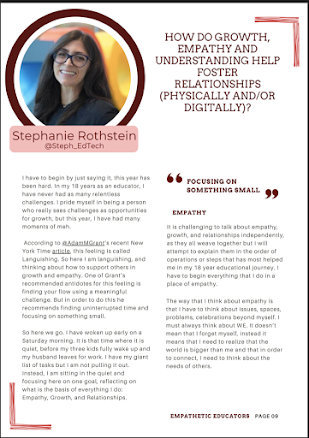HOW DO GROWTH, EMPATHY AND UNDERSTANDING HELP FOSTER RELATIONSHIPS (PHYSICALLY AND/OR DIGITALLY)?
Please check out this post written for and published on #Empathetic Educators and published in the first Magazine of the Series.
So here we go. I have woken up early on a Saturday morning. It is that time where it is quiet, before my three kids fully wake up and my husband leaves for work. I have my giant list of tasks but I am not pulling it out. Instead, I am sitting in the quiet and focusing here on one goal, reflecting on what is the basis of everything I do: Empathy, Growth, and Relationships.
Empathy
Growth
Now we are listening empathetically, but how do we actually grow? This is the reason I created CanWeTalkEDU.com which helps students and educators learn about themselves and others. Can We Talk Monthly Challenges focus us on our own areas of growth which may be natural areas of strength for others. It can be a struggle to know where to begin as growth can be personal and/or professional. For students it may be in specific content. But I have found that if we focus our goals for growth on skills that help us grow as people, all of the other goals become much more clear and attainable.
Relationships
Empathy and growth help us foster meaningful relationships. Relationships matter in and out of the classroom. Students can learn when they feel safe and seen. Staff are open to collaborating when they feel valued. But we must figure out where to begin. According to Adam Grant, we need to find uninterrupted time, focus on something small, and focus on a meaningful challenge. When I reflect on how my deepest educational relationships have formed, they have come out of working together focused on meaningful challenges. We have analyzed areas of growth for ourselves, our students, our pathways. This, honestly, is what I have missed most from this year. I have missed traveling with colleagues, staying together, observing other educators at another school, discussing our takeaways, and applying our learning to what we want to see in our school. I have found connecting with other educators over social media has helped while virtual and I have been widened to grow relationships that span farther around the globe than I ever would have done pre-pandemic. For students, it is about providing them with opportunities to foster these relationships. In my classroom, I give students a meaningful challenge, I ask them to be the ones to create relationship building opportunities for others. They have risen to this challenge and I am so proud of them. In an article I wrote for Edutopia I detail the options that students created. They range from creating a Service Club, to Virtual Movie Nights and my favorite unique idea was a Virtual Cooking Club connected to the reading from class. My biggest lesson for relationship building is to not get in anyone’s way. For students and colleagues, whatever I do must support what they need and I can only understand this by really listening to their needs.
I am grateful to be challenged by #Empathetic_Educators; you have helped me to grow and widen my circle of relationships. We need to continue this practice for ourselves, our colleagues, and our students. So let’s begin. I cannot wait to hear where these relationships bring all of us.


Comments
Post a Comment